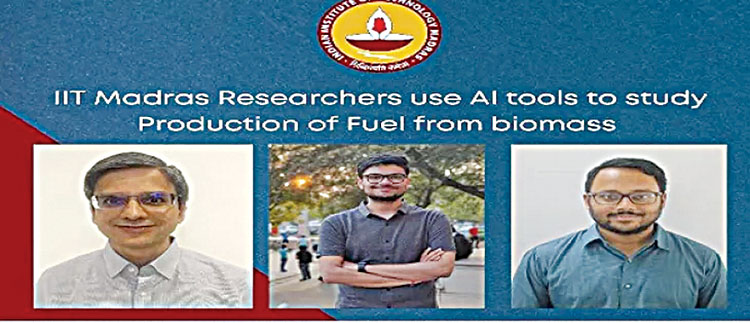Chennai, Feb 9 (Agency) The Indian Institute of Technology-Madras (IIT-M) researchers are using Artificial Intelligence (AI) tools to study the processes involved in conversion of biomass to gaseous fuel. Gaining such understanding through hands-on experiments is time consuming and expensive. Computer simulations and modelling studies can provide quicker insights that can be used to build the processes and plants for biomass processing, a release from IIT-M said today. With increasing environmental concerns associated with petroleum derived fuels, biomass is a practical solution, not in the conventional sense of directly burning wood, cow dung cakes, and coal, but as a source of energy-dense fuel.
Researchers all over the world are finding methods to extract fuel from biomass such as wood, grass, and even waste organic matter, it said. Such biomass-derived fuel is particularly relevant to India because the current availability of biomass in India is estimated at about 750 million metric tonnes per year and extracting fuel from them can tremendously help the country attain self-sufficiency in fuel. The research was led by Dr. Himanshu Goyal, Assistant Professor, Department of Chemical Engineering, IIT-M and Dr. Niket S Kaisare, Professor, Department of Chemical Engineering, IIT-M. Recent results of their modelling studies were published in the prestigious peerreviewed Royal Society of Chemistry journal Reaction Chemistry and Engineering. Dr. Himanshu Goyal said understanding the complex mechanisms involved in the conversion of raw biomass into fuel is important for designing the processes and optimizing reactors for the purpose. He said “there is an urgent need to train the next generation of engineers on high performance computing and machine learning skills so that they can address some of the biggest challenges before us, such as developing zero-emission technologies to tackle climate change.
“This work is one such example”, he added. While models are being developed all over the world to understand the conversion of biomass into fuels and chemicals, most models take a long time to become operational. Artificial Intelligence tools such as Machine Learning (ML) can hasten the modelling processes, he noted. The IIT-Mresearch team used an ML method called Recurrent Neural Networks (RNN) to study the reactions that occur during the conversion of lignocellulosic biomass into energy dense syngas (gasification of biomass), he said.

